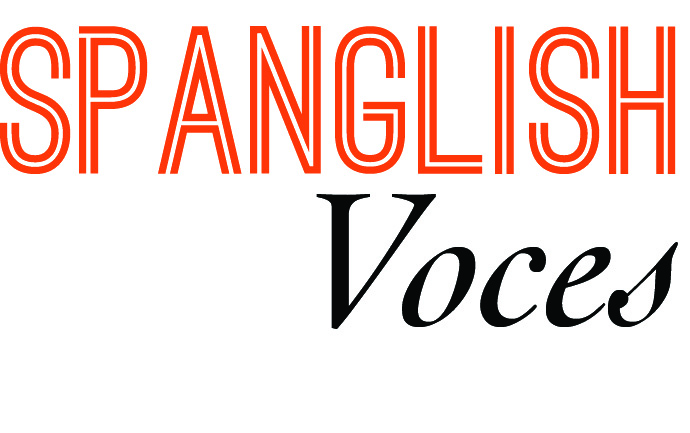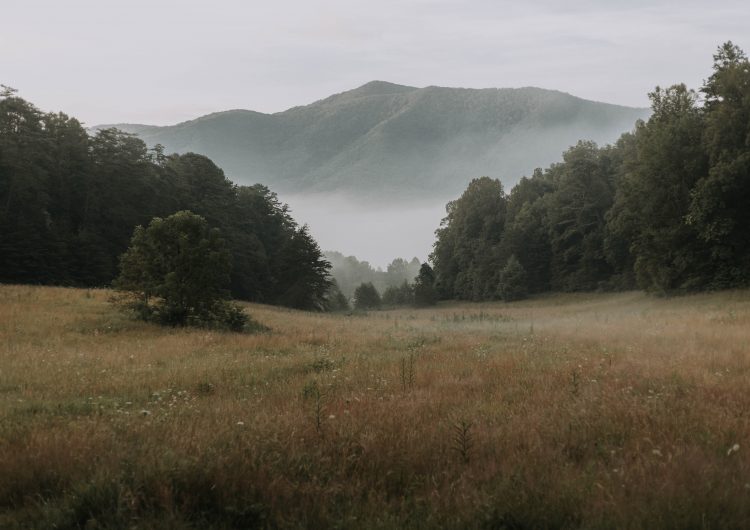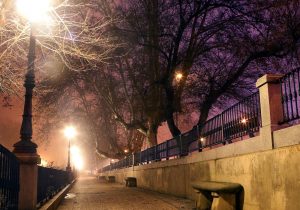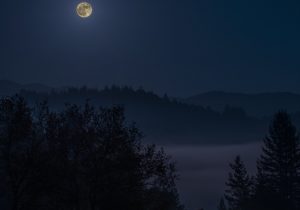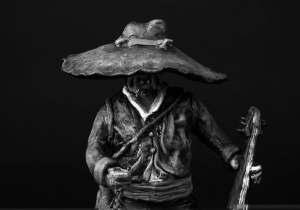“You do not belong here.”
– Jaquira Díaz
In my America
Earlier this year, as I delved into the personal essay form, I couldn’t help but gasp when I read the following lines in a piece written by Jaquira Díaz: “In my America, a white woman at a writers’ conference tells me I look like a gang member, and the next day, a completely different white woman asks, ‘Are those gang signs?’” Díaz’s essay—stitched together with raw and delicious honesty—took me back to May 2017, when I decided to explore the intimidating yet fascinating world of writing retreats. I found out The Sun’s artists’ retreat was a short three-hour drive from where I live, so I thought, why not?
The retreat
“Thomas Dixon wanted this artistic space filled with white people,” the spokesperson for Wildacres Retreat says, taking the crowded auditorium on a journey through the history of the gorgeous conference center situated atop a mountain near the Blue Ridge Parkway. “Good thing the Great Depression swooped in and destroyed his dream, right?” All the heads nod in agreement—what a terrible thing that would have been! As I gaze around the room, I imagine Dixon jumping up and down celebrating the way things turned out.
This reality hit me twenty minutes earlier when I had to face a dining room full of people eerily similar to the folks I left behind in the rural East Tennessee town where I live. I thought I was taking a break from that, immersing myself in a group of diverse, culturally-aware, open-minded writers. So close to Asheville, surrounded by readers of The Sun … I should have stepped into a different world, right?
Are you a dreamer?
As the second day of the retreat folds into a fiery sunset, I nestle in one of the rocking chairs lining the deck across a magical forest. Blue mountains tower over luscious treetops while timid leaves dance around us in shimmery whispers. Settling into the rhythmic rocking of the chair, the stress and fear of being around strangers start to fade away with the sun.
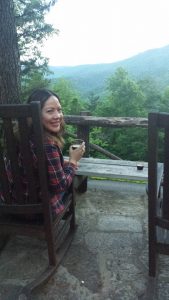
The author moments before the question.
The mountain breeze soothes me. The red wine sipped from a plastic cup warms my heart. This is it: a moment of pure happiness. My soul is about to melt into the brilliant blue sky when suddenly … crash! Like a grey cloud summoned out of nowhere, an unwanted presence invades my sacred space. No introductions, no small talk, a white woman stands in front of me. Lovely view blocked and moment of bliss stomped all over, her question silences the leaves. “So … are you the DREAMer?”
Privacy is not for everyone
A few hours earlier, in the same auditorium in which Dixon’s dream had been judged the day before, the editorial director of The Sun offered a short Q&A session to close the first day of workshops. One of the attendees thought it would be OK to ask what type of topics the editor had discussed in the private meetings some of the participants had been able to schedule with him beforehand. I was confident that surely, the editor of such a prestigious magazine would remind this lady of the meaning of the word ‘private.’ I was wrong.
Without disclosing names, The Sun’s director proceeded to relay the nature of some of those private (I keep repeating this word hoping for a different outcome) meetings. Among the conversations revealed, he said that one of the scholarship recipients—someone who was a DREAMer—asked if he thought it was safe to keep a blog regarding the plight of her (he did reveal the identifying pronoun) undocumented parents. I felt a sting, like an impertinent bee had just decided to mess up my day out in the sun—pun intended. As per Dixon’s dream, I could only count two persons of color in the room.
Great, I thought. They will think that it is one of us. But I shooed away those words telling my paranoid self to stop being afraid of people—and geared up for a pleasant afternoon in the mountains.
Am I a writer of color?
For a while—long before the writing retreat—I had been struggling with identifying myself as a writer of color in this country. I was born and grew up in South America, in a place where I did not have to deal—at least not in a blatant manner—with discrimination based on my skin color. Of course there is racism in my home country—just like everywhere else—but in Latin America, it seems subtler; though I am happy to report this is changing, it was not overtly spoken and written about or challenged while I was growing up.
As I read and learned more about some of the fascinating authors who identify as writers of color, I started to fear I would not be able to claim my place in their world. My parents and ancestors did not emigrate to this country in pursue of a better life, nor did I have to flee the dangers of civil or drug wars. Little by little, I convinced myself that since I did not share their background and their struggles, I did not have the right to call myself a writer of color.
The color of my writing
Díaz’s essay confronted me with the uncomfortable truth. As an immigrant living in the South for the past eight years, I have experienced more prejudice than what I would like to admit—not only because of the way I look, but also because of my South American accent. And even though I’ve reconciled with most of those experiences, they are still part of who I am as a writer. As a person.
It has taken some serious journaling and introspection—along with reading essays by writers of color—but I’ve come to the realization that I don’t have to see myself completely in a determined group of people in order to identify with their values and literary work. Just like all immigrant stories are different, it turns out that I also get to own my story as a writer of color. Yes, I can bring my own color and perspective to the magnificent quilt of U.S. Latino Literature.
As I continue exploring and fine-tuning my writing voice, I’ve often wondered if I should shy away from literary spaces that are not geared to a diverse community of writers. The answer I keep coming back to is a big NO. I must show up to those spaces. I must share my work, let my stories complicate stereotypes and unsettle assumptions. I believe that our love for words has the power to unite us beyond any differences or misconceptions. I want to help other writers and readers—and myself in the process—expand and enrich our cultural awareness and, in this way also, like Díaz advocates, “expand and explore all the things writing can be.”
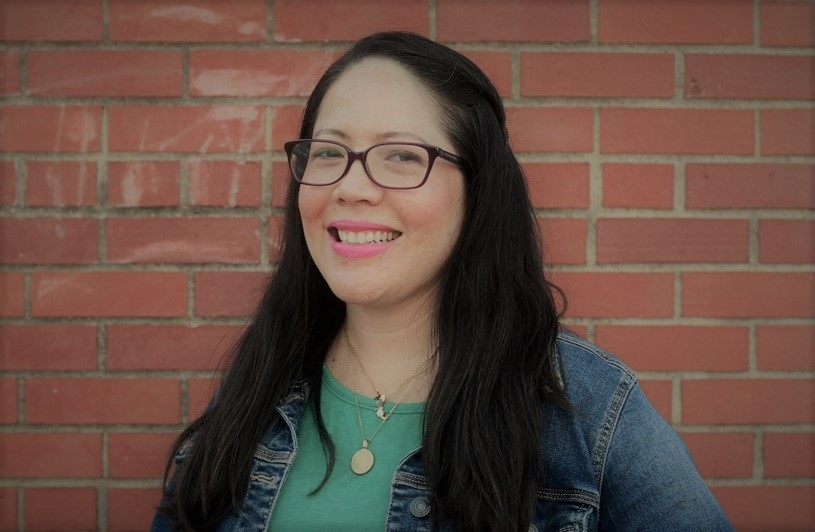 Melanie Márquez Adams is an Ecuadorian American writer, author the short story collection Mariposas Negras and Querencia: Crónicas de una latinoamericana en USA. She holds an MFA in Spanish Creative Writing from the University of Iowa where she was an Iowa Arts Fellow. More recently, her work has appeared in Puerta del Sol (forthcoming), Laurel Review, Launch Ticket, Huella Magazine, and Escritorxs Salvajes: 37 Hispanic Writers in the United States. An International Latino Book Award winner, Melanie translated Layla F. Saad’s Me and White Supremacy for Penguin Random House Español. Follow her: @melmarquezadams, melmarquezadams.
Melanie Márquez Adams is an Ecuadorian American writer, author the short story collection Mariposas Negras and Querencia: Crónicas de una latinoamericana en USA. She holds an MFA in Spanish Creative Writing from the University of Iowa where she was an Iowa Arts Fellow. More recently, her work has appeared in Puerta del Sol (forthcoming), Laurel Review, Launch Ticket, Huella Magazine, and Escritorxs Salvajes: 37 Hispanic Writers in the United States. An International Latino Book Award winner, Melanie translated Layla F. Saad’s Me and White Supremacy for Penguin Random House Español. Follow her: @melmarquezadams, melmarquezadams.

